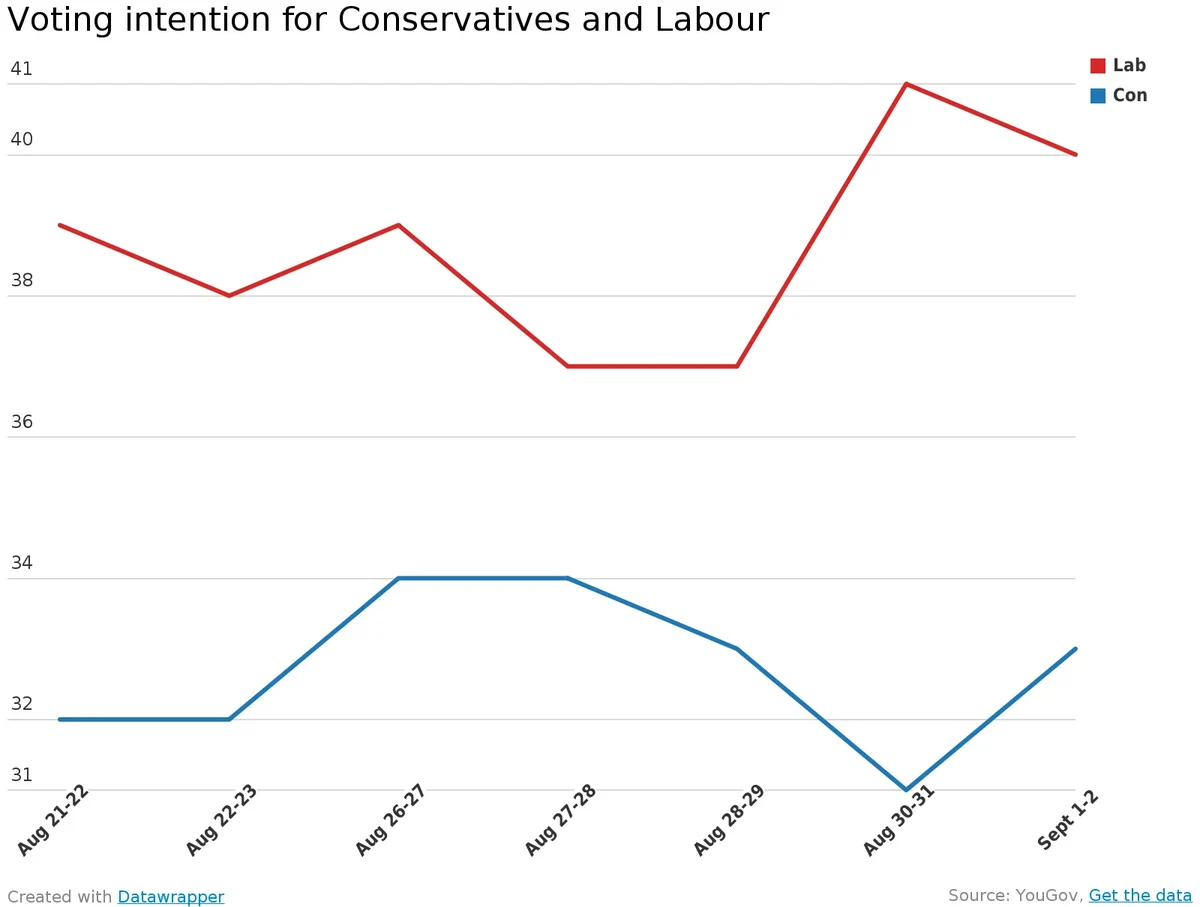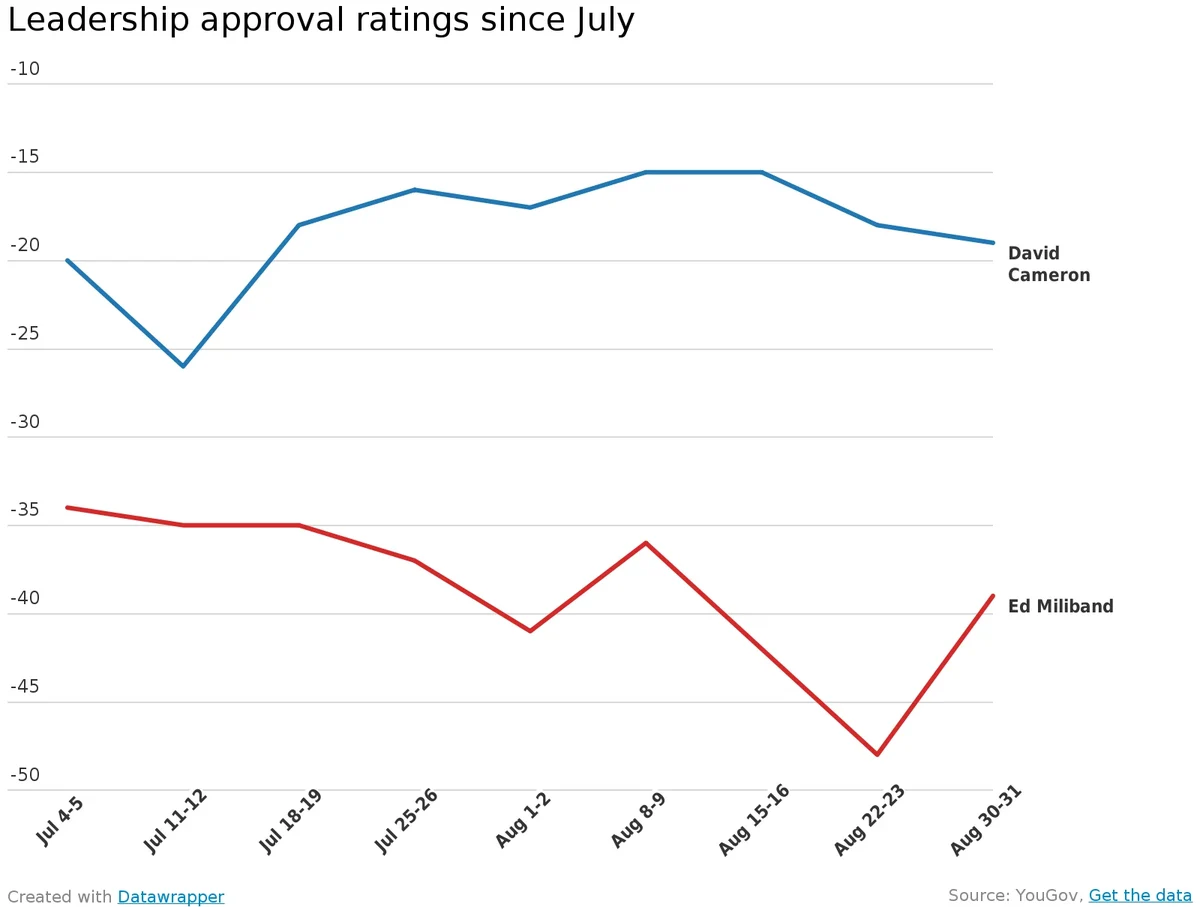Despite media commentary about David Cameron's 'humiliating defeat' over Syria, it doesn't appear to have hurt him or his party much domestically
The past week has been a dramatic one in the history of British politics: the United Kingdom stepped up to – and then back from – the brink of military intervention in Syria, and in rejecting his motion by 272-285, MPs made David Cameron the first prime minister to lose a parliamentary vote on military action in at least 150 years. Many analyists are predicting a major negative impact for the government.
However, YouGov research conducted entirely after Thursday’s vote suggests that while the event may have serious foreign policy implications, it has not significantly changed the country’s political mood; and in fact, in terms of public opinon the events may have been better for David Cameron than Ed Miliband.
First of all, voting intention: after spiking up to a lead of 10 immediately after the vote, Labour is today back at +7, an identical lead to one week ago. The weekend's +10 lead was Labour's widest in YouGov's voting intention tracker for all of August, but lags behind another peak in mid-July when Labour's lead briefly hit +11.

This data comes two days after YouGov found that 68% of the public think MPs who voted against Britain taking any part in military action against Syria – 224 of whom were Labour politicians – got it right.
Still, a YoGov poll for The Times shows that 49% of Britons think Parliament should debate the issue again if United Nations weapsons inspectores report that chemical weapons were used, suggesting the issue may not be completely settled for voters. Only 37% think there is no need for additional debate overall, and only among supporters of UKIP do more voters (50%) oppose more debate than support it (39%).
David Cameron
While the media widely cast Cameron as a man 'humiliated' by the shock defeat, the British public is split about evenly on whether David Cameron showed “strong leadership” on Syria – and much more likely to say he showed leadership than to say the same for Labour leader Ed Miliband.
39% say Cameron has shown strong leadership over the issue while 41% say he has not; but only 28% say Miliband has shown strong leadership compared to 46% who say he has not.
Cameron wins greater support from his own party and every other major party compared to Miliband. While three-quarters (74%) of Conservative voters, half (50%) of Lib Dem voters and 37% of UKIP voters say Cameron has shown strong leadership, just half (52%) of Labour voters, a quarter (25%) of Lib Dem voters and only 13% of UKIP voters are positive about Miliband’s leadership on Syria.
When asked if David Cameron should resign over the Syria defeat, only 3% of Conservative voters and 10% of Lib Dem voters said yes.
Meanwhile the prime minister’s approval ratings have hardly budged. His net approval rating moving from -18% last week to -19% on Sunday, and his personal ratings are up somewhat. 26% now think he 'sticks to what he believes in' compared to 23% two weeks ago, and similarly the proportions who think he is 'strong', 'decisive', 'honest' or 'a natural leader' are all up by 2-3%.
Ed Miliband
The new polling is something of a mixed bag for the Labour leader, who surprised many by turning against taking action in Syria.
His net approval rating was up to -39% on the weekend – an increase of 9 points on the previous week – but still behind the -36% he received just three weeks ago. 63% now say he is doing badly, and 24% say he is doing well.

The Syria vote seems to have done nothing to reverse the downward trajectory in the Labour leader's other personal ratings that has clouded his summer.
Since August 19-20, the percentage who think he 'sticks to what he believes in' (13%) is unchanged as of September 1-2; the same goes for the percentage who think he "stands up for ordinary people, which is basically flat with a 1% improvement; and the proportion of the country who think he is 'honest' has even dipped slightly from 16% two weeks ago to 14% today.
Image: Getty






